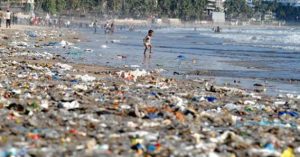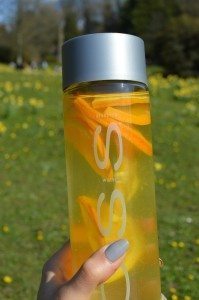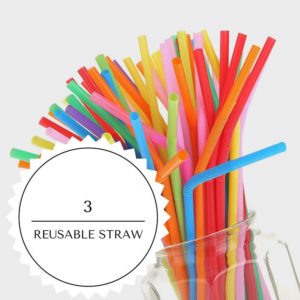Plastic is everywhere these days. Just think about your day so far. You probably woke up and reached a plastic tube of toothpaste, brushed your teeth with a plastic toothbrush wrapped your lunch in a plastic bag, packed a plastic water bottle and then walked out the door for work. This is all before your day has even begun!
In the past 30 years alone, the amount of plastic produced worldwide has increased by 620 percent! On average, that equates to 300 million tons of plastic a year. Of this 300 million tons, about 8.8 million tons find their way into the world’s oceans where they are left to slowly (from 100 to 1000 years) photodegrade into smaller pieces. The fact is that plastics never really “go away,” we find our oceans crowded with a massive soupy mixture of harmful plastic products. Is this the world we want our kids to live in?
Plastikas visur aplink mus. Pagalvokite apie savo dieną. Atsikėlėte ryte, išspaudėt dantų pastos iš plastikinės tūbelės, išsivalėt dantis plastikiniu dantų šepetėliu, supakavote sumuštinį į plastikinį maišelį, pasiėmėt plastikinį butelį vandens. Koks kiekis plastiko jūsų dienai vos tik prasidėjus!
Per paskutinius 30 metų plastiko gamyba išaugo 620 procentų. Tai maždaug 300 milijonų tonų per metus. Iš jų, maždaug 8.8 milijono tonų patenka į vandenynus, kur pamažu yra į daug smulkių plastiko dalelių. Sakydama pamažu, turiu omenyje 100-1000 metų. Tiesa yra tokia, kad išmetus plastiko buteliuką į šiukšlinę jis niekur nedingsa, o vandenynai virsta plastiko sriuba. Ar norime, kad tokiame pasaulyje gyventų mūsų vaikai?
Giving up plastic seems like a monumental task to some people. The funny thing is that if you go back 20 years before that, commercial plastics didn’t even exist! So how is it that we, as a society, could go from not even having plastic to feeling as if we cannot live without it? There is a simple way to give up plastic by choosing reusable items in place of disposable. Here is the list of simple steps you can take to reduce the plastic waste.
Atsisakyti plastiko kaip kam galii atrodyti kaip neįmanoma misija. Bet įdomus faktas, kad prieš 20 metų, komercinis plastikas net neegzistavo, o šiandien mes galvojame, kad be jo negalime gyventi? Štai penki, labai papasti žingsniai, kaip sumažinti plastiko vartojimą.
SAY NO TO BOTTLED WATER
60 million water bottles are landfilled a day. A DAY! Is bottled water tastier, healthier than the tap water? The bottled water industry would like you to think so. The truth is that bottled water is less regulated than the water that runs from our taps. Why are we paying for a product that costs at least a thousand times more than what runs from our taps than we aren’t even guaranteed it’s safer? I love my glass bottle and making citrus infused water – healthy, tasty, environmentally friendly! Afraid to forget your bottle? Read some good tips here.
60 milijonų plastikinių vandens butelių išmetama kasdien. KASDIEN. Ar vanduo buteliuose skanesnis ir sveikesnis negu iš krano? Vandens buteliuose pardavėjai norėtų, kad mes taip galvotume. Tiesa ya tokia, kad vanduo buteliuose mažiau tikrinamas ir reguliuojamas, negu tas, kuris bėga iš krano. Tad kodėl mes sutinkame mokėti tūkstančius kartų daugiau už vandenį, kuris nėra nei saugesnis, nei sveikesnis? Pati naudoju stiklinį butelį ir į visas keliones imu citrusiniais vaisiais pagardintą vandenį. Kai baigiu, paprašau bet kurioj kavinėj jį papildyti – kol kas, niekas neatsisakė. Sveika, skanu ir sutaupo ne tik daug pinigų, bet ir saugo aplinką. Bijote pamiršti butelį? Tai tiesiog įpročio klausimas. Su laiku įprasite, taip, kaip pasiimti raktus ar piniginę.
SAY NO TO PLASTIC BAG
If there is one thing all of us can do to reduce the amount of plastic waste we generate, it’s to say no to disposable plastic bags. A Google search on “animals eat plastic bags” brings up hundreds of heartbreaking stories around the world. There’s no reason why bringing your own bags to the store shouldn’t become the norm for us to do. Farmers markets are a great way to buy fresh, local produce without plastic, as long as you remember to bring your own bags.
Jeigu kalbėti apie vieną, minimalių pastangų reikalaujantį būdą sumažinti plastiko kiekį, kurį tikrai galime padaryti kiekvienas iš mūsų, tai būtų atsisakyti plastikinių maišelių. Įvedę į Google paiešką “gyvūnai valgo plastiko maišelius” rastume gausybę liūdnų istorijų ir vaizdų. Nėra jokios priežasties, kodėl daugkartiniai krepšeliai neturėtų būti norma. Turgus yra gera alternaytva apsipirkinėjimui be plastiko pakuočių – jeigu nepamiršite daugkartinio pirkinių krepšio.
SAY NO TO STRAW
Drinking straw is not necessary, however, it might be if you have kids 🙂 Go for a reusable straw. Reusable straws made from glass are nice because they are see-through, so you and tell if they are clean or not. You can get even a mini brush to clean them! If you are worried about breaking glass straw, there are stainless steel straws available.
Nors šiaudelis ir nėra būtinybė, tiems, kas turi mažų vaikų, jie gana reikalingi 🙂 Gera žinia ta, kad šiandien galima rinktis iš daugybės daugkartinių šiaudelių. Stikliniai šiaudeliai geri tuo, kad gerai matosi švarūs jie ar ne, tačiau jeigu bijote sudaužyti stiklinį šiaudelį, galite rinktis metalinį.
SAY NO TO DISPOSABLE CUP
I am a huge coffee lover! Therefore, a travel mug for me is a must. Believe me, you will never have a problem getting your mug filled. In fact, most cafes these days will give a discount for bringing your own mug. There are plenty beautiful travel mugs to choose from!
Aš esu prisiekusi kavos mylėtoja, todėl man kelioninis kavos puodelis yra būtinas 🙂 Patikėkit manim, jums ne tik niekada nekils problemų prašant įpilti kavą į jūsų, kaip kuriose kavinėse dėl to netgi gausite nuolaidą. Kelionių puodelių yra visa galybė, todėl puikiai rasite atitinkantį jūsų skonį bei stilių. Tai gal net taps jūsų stiliaus dalimi.
SIMPLY BE CONSCIOUS
At the end of the day, the fewer products we use, the fewer resources we consume. Every time you buy, think if you really need. Whenever you can, choose a plastic-free package. For example, swap liquid soap in a plastic bottle with a simple soap bar, buy products in tins, glass jars, paper package. If you must use plastic, make sure you avoid the worst plastic. Don’t flush plastic down the drain. Many exfoliating scrubs contain tiny microbeads made from polyethylene plastic. Water treatment facilities are not designed to filter out such a tiny particles, so they enter to our oceans and ends up in the bodies of aquatic creatures.
All we need is little bit more responsibility. Remembering that life was and is possible without plastics is key to helping us pursue lifestyles that now break away from this material.
Galų gale, kuo mažiau produktų naudojame, tuo mažiau resursų eikvojame. Kas kartą prieš perkant, pagalvokite, ar tikrai jums to reikia? Rinkitės pakuotę, kuri nėra plastikinė: popierinė, metalinė ar medinė. Pakeiskite produktus namuose į plastc free, pvz vietoj skysto muilo plastiko buteliuke, naudokite paprastą muilą. Jeigu negalite atsisakyti plastiko, laikykitės atokiau nuo pačio pavojingiausio plastiko. Jeigu jums nerūpi gamta, rūpinkitės bent savo sveikata.
Nenuleiskite vamzdžiais plastikinių mikrogranulių, kurių yra daugelio šveitiklių sudėtyje. Vandens filtravimo įranga nėra pajėgi išfiltruoti tokias mažas mikrogranules, tad jos sėkmingai nukeliauja į vandenynus ir žudo gyvūnus. Viskas ko reikia – tai šiek tiek daugiau atsakomybės. Prisiminkite, kad gyvenimas buvo įmanomas ir be plastiko, tad galime pabandyti jo jei neatsisakyti, tai bent kažkiek sumažinti kasdieniniame vartojime.
Lot’s of love,
E.


















Since i have read about your plastic free challenge it has been paying on my mind. Every time i am at the shops buying food, i get so annoyed that every single fruit or veg is wrapped in plastic. No supermarket sell organic loose food. WHY??? so many countrys like France and Germany manages to recycle so much more then UK. I could go on about this for ages :).
Anyways we try and do our bit, and reading your blog is always refreshing and helpful. xx